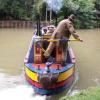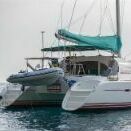Leaderboard
Popular Content
Showing content with the highest reputation on 07/09/16 in all areas
-
Please everyone, get a sense of perspective. There are many activities where being under the influence increases the risk of causing death or injury to yourself or others and has done so on far more occasions then steering a narrowboat, including cooking chips when drunk and burning the house down, falling asleep drunk while smoking and burning the house down, crossing the road drunk and being run over, going for a drunken midnight swim and drowning, leaning on a balcony while drunk and falling off, riding a bike while drunk and falling under a truck -- how long a list would you like? It's generally agreed that doing lots of things while paralytically drunk is a bad idea, including steering a narrowboat. Fortunately the law has the sense to only make being drunk an offence in itself when the risk -- especially to others -- is considered significant enough to need a specific law, which is the case for planes/cars/ships/trains/air traffic control. For those saying that drinking (not to the point of being legless) and steering a narrowboat is *really* dangerous because horrible things *might* happen, perhaps you need to think about the real risks compared to many other everyday activities which people do perfectly legally after drinking and where nobody says they're automatically irresponsible idiots. If you really disapprove so much of drinking and doing stuff, you'd almost certainly get a much bigger reduction in death and injuries by creating offences of frying chips/smoking/crossing the road/leaning on railings when drunk than narrowboating while drunk...4 points
-
What is the case, exactly? How do you balance the (insignificant compared to many other things) risk reduction compared to the inconvenience caused to tens of thousands of people, 99.9% of who will never have the type of "accident" being discussed? It's always possible for people with a "nanny state" mentality to find reasons why something they disapprove of should be banned or controlled, even when there's no evidence that the risk they're trying to avoid is of any significance whatsoever compared to all the other things that happen in life. There is a general principle in law that people shouldn't be banned from doing something which has some risks but where the main potential harm is to themselves or other people voluntarily joining in with what they do and where the accident/death rate is small, otherwise we'd see bans on mountain climbing, parachuting, tightrope walking, motorbike racing, caving, boxing, and many other activities. If tens or hundreds of people were killed or injured while drunk narrowboating every year and being drunk was shown to be the cause of the accidents then I'm sure a law would be brought in similar to that for driving, and nobody would argue with this. From reading up on fatal canal accidents (or boats sinking in locks) it seems that few or none of them had drink as a direct or even contributory cause, in most cases the cause was inattention or inexperience or distraction or failing to take the correct action to prevent the tragedy -- in other words, human error. But in any case the risks are very low and serious incidents are rare -- I'll bet that statistically more people going on boating holidays are killed or injured driving to the boatyard than on the boat, even with inexperienced hirers. So there doesn't seem to be any real argument -- apart from fearmongering -- to either require private hirers/owners to take a "canalling test", or introduce blood/breath alcohol limits like for cars. In fact the two are often linked, in most cases activities (like driving a car, or flying a plane) judged to be dangerous enough to need you to pass a test, there are also alcohol limits -- for exactly the reason that if it's dangerous enough to need a test, the increased risk due to alcohol is also significant. Narrowboating doesn't fall into this category, and hopefully never will...3 points
-
I would say huge numbers of people have died on the English canal system in recent years as a direct result of alcohol consumption. I could probably get to double figures based on incidents I recall no more than 20 or 30 miles from where I live. However hardly any relate to attempts to navigate a boat. I probably couldn't think of one single example that is no more than 20 or 30 miles from where I live. Just about anything that sticks in my head relates to something that happened when boats are tied up. It may be attempts to cross locks whilst intoxicated, it may be attempts to jump narrow locks whilst intoxicated, it may we as a result of failure to manage a solid fuel stove while intoxicated. It is very, very rarely an attempt to go boating whilst intoxicated. Even if we introduced mandatory training, and certification of steerers, and breathalyser testing of them, my view is that the number of people who die as a result of alcohol consumption on the English canal system would remain largely unchanged. I think some of the debate above, whilst interesting, really has lost all track of what the real risks actually are, and what most of those who have died were actually doing when they did.2 points
-
I have to say this is one of the biggest reasons why we'll never live on a boat, I just don't want to get rid of my stuff. No I won't feel better for it, and it's my choice. I like being the one in the road who friends come to borrow tools and pots and pans from, I like space around me, I like to have a sewing room where I can leave the sewing machine set up to use when I want. I like having tools to do the job, and so does Richard. We love our time on the boat, but afterwards I like to get back to space, a flushing toilet, a kettle that boils is a minute or so, plenty of places to hang wet clothes, a decent shower that I can have without thinking about running the engine to keep the water hot etc etc. So no it's not for us, but it the lifestyles for you then that's great, you'll make it work for you somehow. Having said that it's about tie for a bit of a declutter and tidy up. I also don't buy the argument that I should have a clear out before it all gets left to the kids to do. Why should I get rid of stuff I like so they don't have to deal with it. When I've gone I'm not going to care if it all goes in a skip, but I do care about it now. Just another take on the situation. Sue Sue2 points
-
All this is of course true, however I don't think it is particularly helpful to dwell on what is wrong with everything boat, better to concentrate on what is still to be enjoyed on the waterways, of which there is plenty. Times move on, for better or worse, and one just has to get used to it. We have occasionally been on the receiving end of "canal rage" for ludicrous things like passing a boat with 3' of slack in its lines, and tied primarily on the roof centre line, too fast (having been on tickover and passed numerous other boats satisfactorily), helping to open a lock gate without begging for permission to do so first, failing to give way to an oncoming boat at a bridge hole when we were way nearer than the oncoming boat, and lots of other stupid stuff. But as I said, best not to dwell on it and rather, bear in mind how miserable these folk must be with their lives!2 points
-
2 points
-
My Grandfather William Yarnall had a regular run from Brentford to Wellingborough carrying grain from 1910 to 1914 he worked for Emanuel Smith Canal Carrier of Brentford. He carried between 52 to 56 tons on 2 boats. I have his log book of the journeys taken during 1910-1914 I know it is not the time line you are writing about but I have records of my great great Grandfather another William Yarnall carrying wheat to Houghton Mill on the River Nene 21/03/1878 these records are from the Nene navigation records.1 point
-
I've had the same problem and found impact drivers will only work some of the time. Just grind the heads off and save the bother. Once the lid is removed the tension is off the remaining threaded bit and will unwind with a pair of mole grips. I replaced mine with button head hex machine screws in stainless.1 point
-
I accept defeat as I am clearly far to young for my opinion to matter. My 45 years of experience with working narrow boats (professional and recreational) not to mention being taught by boaters - leading to 30 years of narrow boat research count for nothing when compared to an elderly 'gongoozler'1 point
-
Now now Mike, remember that just because you and Alan have had a bad experience with them, there are many others, like me, who have actually bought a boat from them and think they're excellent.1 point
-
I'm 123 and have been boating for two hundred years, so everything I say is gospel. Not really, I mostly talk fluent tosh. Rog1 point
-
I believe they prefer this to risking that any of the "rivets" may get knocked off!1 point
-
Yes after having one sat on my drive for 18 months.....by eck its been that long, i can 1000% say it is a Buckingham. The rear main bulkhead on mine is a one off i think, i still have to find one with a GRP bulkhead, all ones i have seen have got a wooden flat type. What is fitted to yours? if you anyhting liek me you will be making more than curtains new build thread maybe1 point
-
For me, in this thread, the comments to pay attention to are the ones saying 'I went to only look at 'X' and I bought 'Y'' Boats are like that. If you love a boat, you'll put up with the 'faults' Richard1 point
-
If you've met many victims of catastrophic events can you post your whereabouts when boating so I don't become one of them....1 point
-
yes what does the Maritime Coastguard Agency know about ship handling...... Take it you didn't READ the Marine Guidance Notice since it takes into account the depth of water as well as giving each other sufficient room? Having manoeuvred and passed other ships on the MSC and Kiel Canal where you actually do perform the "dance" on a much larger scale. Trust me what is fairly routine on the inland waterway gets positively interesting with two 20,000 dwt ships approaching each other. However same principles apply, adjust speed so you have more RPM to manoeuvre with, edge over towards edge of channel, the bows of each ship are pushed aside so you have then steer in towards the other ship with a bit of extra speed and as the sterns pass, put the opposite helm on with a further increase on the RPM to swing clear. Exactly the same as I have been doing for the last couple of weeks on canals....1 point
-
A very good point. I very rarely find I want one, but on those rare occasions one would have been really, REALLY useful!1 point
-
Most likely I'll sell some instruments but still live in a cluttered-up boat because there are several I just can't bring myself to part with. Some of them are fairly small, at least. Nice!1 point
-
1 point
-
wow!His sweatshirt really blends with the poster on the back wall.1 point
-
I used to have an old electric guitar, a new electric guitar, an electro-acoustic, a nylon strung acoustic and a uke on my boat. I now have the nylon strung and the old electric. Compromises are sometimes needed. Your choices are 3: Sell some instruments, live in a cluttered up boat, don't buy a boat.1 point
-
perhaps he's just invading the privacy of the owners for a bit of fun actually, thats probably against forum rules, (the privacy bit not the fun part).. this place is going to the dogs1 point
-
In our many years of boating, I cannot recall a single incidence of someone being injured as a consequence of drinking. I have occasionally seen a day boat with an obviously 'windswept and interesting crew' who were not behaving in the best traditions of canal boating, but have not witnessed any actual injury. My post wasn't intended to be a rallying cry against the demon drink, I was just mildly curious about others views. We occasionally see boats cruising in a morning (before 10am) with cans of lager etc being drunk. It's noticeable, because whilst I love a beer or several, it's far too early for me. 'A chacon son gout' . Whilst I understand the warnings from several posters of dire consequences would not the facts suggest many people drink and handle a boat quite happily and harmlessly ? Thanks for all the comments anyway, I've enjoyed them all. Rog1 point
-
It does depend on the amount of water coming down. Of course you will anticipate the sideways movement, but it's not consistent from lock to lock. Especially when there's a lot of water coming down, every lock is different. As you say, the boat will go sideways "a foot or so". The problem is the "or so" bit of that statement. You have no way of knowing how big the "or so" factor is before you get there. It can make the difference between gliding gracefully into the lock or clonking the wing wall at 2 or 3 mph. Yes, you can do it without a BT with no problems, but there are times when a BT would be useful.1 point
-
Last year I decided to paint over the internal plywood cabin sides above the gunwall which had previously been scumbled including a varnish layer.We used ZinsserBIN Primer-Sealer & Stain Killer.Paint went on OK and wood grain shows through nicely.So far no bleeding.Quote from advert:B-I-N Primer-Sealer: - is the ultimate shellac-based primer, sealer and stain killer. It is perfect for use on interior surfaces and spot priming of exterior surfaces.B-I-N offers unparalleled adhesion to glossy surfaces including glass without the need for scuff sanding it also blocks stubborn and persistent stains. The high adhesion shellac formula seals porous surfaces with excellent enamel holdout, even sealing bleeding knots and sap streaks.1 point
-
Get a veg steamer. Well, be sure to bring the grand piano. I never go nowhere without mine.1 point
-
All possessions are just potential trauma and heartache for your children to have to deal with you die, they might even feel obliged to take on some of your trinkets as their own millstones. Only own things that your children will really want to inherit, tools and model railways and stuff like that! ..............Dave1 point
-
1 point
-
I think having a bow thruster stops people learning techniques to handle a boat as it is easy to just flick a button rather than learning how to manoeuvre their boat using the engine and lines.1 point
-
Regardless of whether someone has had three, two or none, blind corners etc should be approached as slowly as required so as to avoid any chance of collision. It should always be possible to stop a boat within significantly less than visible distance and there are some bridges where it is wise to approach at no more than the bare minimum needed to steer. At sensible speeds boats should be able to pass in some of the most contorted of ways but always under the control of both helms, who if needs be may have to gesture and communicate with each other. If someone can't operate the boat as well as they can normally then they have had one too many. This should be apparent to any helmsperson and I think many of us suspect this to be a little above the drink drive limit for the roads but not half a dozen cans of premium ale. Same however goes for phones and speed. Some people should stop reading Facebook/texting whilst at the helm and instead enjoy the scenery at a more sedate pace. On stretches of water a person knows well, even after a pint, they may be far better equipped to deal with those dangers lurking around every corner compared to someone on those given waters for the first time, regardless of who has or has not had a pint of bitter. If you know that a certain feature of the canal makes only one angle feasible for a boat of a given length it is useful info and you'll line it up in a controlled manner. This may not be known to someone who is stone cold sober and has just made their way onto those waters and is bound to give their boat a bash. If the inexperienced boater is cautious enough they will get away with a slow little scrape of the coping stones and remember for next time. Going at full tilt, sober or drunk, and the risk of damage/injury is greatly increased. About 15 years ago, when a friend and myself were moving another friend's boat we got clouted by a lads party on a hire boat near Llangollen. We were running our boat 'dry until moored for the night' but the hire boat's crew were three sheets to the wind and clueless re the waters or how to handle a long steel tube. It was obviously a bit slow for them because they seemed to think they could get it round a tight blind bend with the equivalent of a handbrake turn. Idiots. They were not only sozzled but the inappropriate speed for the conditions made them hitting something (us) an inevitability. Personally I don't often have a beer whilst going along but I have in the past taken a boat out after having had a couple in the pub. My preference as a solo boater is to take a boat to near a decent pub and then have an ale tasting session and then stay over for the night moored up, returning the boat back next day. That is because I can stay over. Two guys I see regularly take out a little cruiser to the pubs near us but have to return to their mooring the same day. They're always in control and well equipped to make the journey. Have no issues with that. Nobody is going to run out in front of you from between two moored boats but 16 tons of steel is plenty enough to cut a GRP cruiser in half so nobody should be flippant when it comes to booze and boats. For those who wish to eliminate danger as much as possible, mandatory lifejackets, hard hats and staying in the marina may be in order.1 point
-
Many years ago I brought back wood carving from Jamaica & it took pride of place in the living room. Some months later I found the tell tale pile of wood dust. Oh 'eck what to do? I managed to acquire a quantity of formaldehyde together with a syringe & needle. I squirted formaldehyde into a hole and it was just like one of those cartoons where the hero has been shot, the pressure opened up holes all over the thing. I guess the carver had simply covered them with wax or boot polish. Anyway, I stuck the thing into a large poly bag & left it in the garage for a month. After this time the smell had dissipated, I filled the holes with wax, polished with boot polish (I'd seen the carvers do this) and all has been well for some 45 years. Similar cure to that used by Zenataomm - yes it does work. I guess you could maybe use poly sheet & masking tape to cover the "woodwork above" I was told that once you see the hole it's too late - the bird (bug in this case) has flown but I've never found any other evidence around the house. HH1 point
-
Tell tale signs like a big red nose, ruddy complexion, bloodshot eyes, pot belly, that sort of thing?1 point
-
I have treated wood that couldn't be soaked externally before, but it is time consuming and fiddly. I went onto eBay and bought a pack of syringes (not hypodermic - you shouldn't need needles) Cover any and all furnishings under the area. Squirt the liquid into the largest holes you can find, you will probably be pleasantly surprised that it squirts back out via the smallest ones. They are often all connected. If you can't get a tight seal around the end of the nozzle push it through a ball of BluTack, and use your spare hand to hold it snug against the wood. It will take a long time and you're asking for too much so far as no smell is concerned. However it's cheaper than the alternative. And it has worked for me. Good luck.1 point
-
Ronseal woodworm treatment does exactly what it says on the tin. http://www.wickes.co.uk/Ronseal-Woodworm-Killer-Interior-Exterior-Wood-Treatment-1L/p/147601?CAWELAID=120135120001234160&CAGPSPN=pla&CAAGID=17408411932&CATCI=aud-162418604692:pla-193347849412&utm_source=google&utm_medium=cpc&utm_term=&utm_campaign=Google%20Shopping%20-%20Garden&tmcampid=&tmad=c&tmplaceref=BHt9Se8P&utm_content=sBHt9Se8P%7Cpcid%7C43364563852%7Cpkw%7C%7Cpmt%7C%7C&gclid=CKbD0rSu-84CFcQp0wodt7QHFQ#prodDynamicDeliveryTabTab You do have to brush it all over, if you don't soak the wood you can't be sure of killing all the little beetles. Beware - it stinks. If the wood is varnished then it won't work. Not really sure what to suggest in that case. Tony1 point
-
Burning coal is usually OK, it's the Un seasoned wood (damp) that causes problems.1 point
-
Good for you. What issue needs addressing? I take it you don't get invited to many parties?1 point
-
Or having a Manic Phase of Bipolar, ive been sectioned loads of time under a 136 and cuffed up only to return home and the neighbours avoid me like the plague. Never jump to a conclusion, not everyone in cuffs is a criminal.1 point
-
my view... move my boat if you need to, as long as you don't move it too far and it's securely moored I won't be annoyed. you may tie the lines differently to me and I will probably re-tie them but that is my preference not a reflection on your method1 point
-
In these few post there have been put forward all the arguments that were made against the bringing in of the breathalyser laws. Ask any well qualified medic what the effect of 0.04 of a pint of alcohol is on the body and brain. I am not going to detail it because I suspect even those saying drinking alcohol and navigating a boat is perfectly OK, actually know how much it slows down reactions etc. Someone even mentioned the effect of 1 G&T had on the ability to control a car at slow speed, less than 4 mph I would guess. Please think about others if you won't think about yourselves and don't drink alcohol while navigation. ETA missing words1 point
-
I can't help thinking that the sort of stumbles and fumbles that might leave you with a stubbed toe or a dropped phone on dry land suddenly become a lot more risky when you're operating a lock or stepping off a boat. But it's easy for me to weigh the risks against the rewards and come down on the side of not drinking, because I don't like the stuff anyway!1 point
-
We had an incident last September which was sobering (excuse the pun). While moored and getting ready to visit the local pub for a meal, a boat attempted to moor ahead of us. It was single handed and the steerer was a rather rotund gentleman around 55. He fell in without anyone noticing him for a couple of minutes, but he managed to grab one of his fender ropes (his engine was fortunately in neutral). I eventually noticed him and ran out with the aluminium rescue ladder , a boathook and a lifebelt. He was already incapable of doing too much to help himself but I managed to hook him with the boathook and dragged him to the bank which was sheet piled. He was incapable of climbing the ladder because he was already very cold and unresponsive and it took the combined efforts of me and three passers-by to eventually drag him out. An ambulance was called and he was taken to hospital. When things had calmed down I went on board his boat to make sure it was securely moored etc and in the cockpit was a nearl;y empty bottle of wine which he had been drinking as he cruised along. Now, I am not a kill joy and I can quite see the attraction in enjoying a beer etc. while cruising, but please remember what effect alcohol can have if the unexpected happens and you have to deal with a sudden emergency. The incident I mention certainly was a good object lesson for those who cant see any harm in drinking while cruising. Personally, I would suggest that most responsible people would not dream of driving a car while having a beer and I think the same thought process should apply when cruising, whether on the canals or on lumpier waters. Howard1 point
-
I agree although neither my wife or I are big drinkers anyway. I never drink alcohol when using the boat. When it comes to safety and ability alcohol never helps for sure. I would rather enjoy a class of something in the evening when moored up. I don't wish to be judgemental about other peoples choices as long as what they do does not adversely effect me or others folk can do what they like but I am weary of sharing locking with people who have been or are drinking alcohol. We have had a bad experience in the past doing this.1 point
-
This post cannot be displayed because it is in a forum which requires at least 10 posts to view.
-
Think hard about this. Nobody knows what the housing market will do, but if the options are being in the market, or exiting it, then the risky call is to leave the market. House prices may crash, in which case you win, or they may continue to climb, in which case history tells us that your house money could be worth half or a third of a house by the time you come to buy another. Yes, renting is a risk, but it's difficult to see how selling the house and putting the money in the bank is less of a risk. Plus, the returns on money in banks are really, really, bad compared to the returns on the same money in the form of a rented-out house. Money-where-your-mouth-is-time: as full-time liveaboards, with a house left over from our previous life, we will definitely be renting out and not selling. MP. ETA. As far as the boats are concerned, I have little expertise to add, but having boated the NE canals, mostly for the first time this summer it occurs to me; would they be OK on the Leeds and Liverpool, Calder and Hebble, Rochdale etc? Thats a big chunk of good CC livaboard territory that you shouldn't eliminate by accident.1 point
-
Similar to BWML who before they will allow you to take a 'leisure' mooring require proof (a council tax bill in your name) that the boat is not your primary residence. You can spend as many nights as you like on the boat as long as there are not more than 28 consecutive nights on board in the marina (take the boat out and moor up outside the entrance overnight) and then back in the next day. You are 'covered' the marina is 'covered' and everyone is happy.1 point
-
Reading Nigel Calder's book "Boatowners Mechanical and Electrical Manual" the section on batteries has him revising his opinion of "sealed" batteries to the extent that he suggests that for certain leisure boaters they may now be the better choice. This is the gist of the argument: In practice, because of their slow charge acceptance rate (the time it takes for the acid to diffuse through the thick plates), wet-cell batteries are frequently not fully charged and as a result slowly sulfate. Given equal charging time, gel-cells and AGMs, with their higher charge acceptance rate, will be more fully charged. This may well result in a higher cycle life for the gel-cell or AGM. He goes on to reinforce this by explaining the gel/AGM battery's greater tolerance of being left unattended for long periods. I realise that with the sophisticated electronic systems on boats these days the first shortcoming ie undercharging, can be overcome, but an alternator battery charger is a very expensive item and I'm thinking if the boat is going to be left for several months anyway maybe I would be better spending the money on decent sealed batteries. I don't particularly want to remove the batteries every time the boat is left. Just wondered what real life experience there is on the forum regarding different battery types.1 point
This leaderboard is set to London/GMT+01:00































